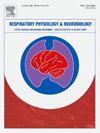吸气肌训练可改善肌痛性脑脊髓炎/慢性疲劳综合征和 SARS-CoV-2 急性后遗症患者的自律神经功能:一项试点研究。
IF 1.6
4区 医学
Q3 PHYSIOLOGY
引用次数: 0
摘要
SARS-CoV-2急性后遗症(PASC)或长COVID,与肌痛性脑脊髓炎/慢性疲劳综合征(ME/CFS)都是使人衰弱的病毒后遗症,有许多症状重叠,包括运动不耐受和自主神经功能障碍。这两种疾病的发病率都在上升,因此必须研究有效安全的治疗策略。我们假设,吸气肌训练(IMT)可用于 PASC 和轻度至中度 ME/CFS,以减轻症状、提高运动能力和改善自律神经功能。我们招募了健康对照组(12 人;10 名女性)、PASC 患者(9 人;8 名女性)和轻中度 ME/CFS 患者(12 人;10 名女性)完成为期 8 周的吸气肌训练。该项目已在 clinicaltrials.gov 注册为临床试验(NCT05196529)。完成 IMT 后,所有小组的吸气肌压力都有所改善(p本文章由计算机程序翻译,如有差异,请以英文原文为准。
Inspiratory muscle training improves autonomic function in myalgic encephalomyelitis/chronic fatigue syndrome and post-acute sequelae of SARS-CoV-2: A pilot study
Post-acute sequelae of SARS-CoV-2 (PASC), or Long COVID, and myalgic encephalomyelitis/chronic fatigue syndrome (ME/CFS) are debilitating post-viral conditions with many symptomatic overlaps, including exercise intolerance and autonomic dysfunction. Both conditions are growing in prevalence, and effective safe treatment strategies must be investigated. We hypothesized that inspiratory muscle training (IMT) could be used in PASC and mild to moderate ME/CFS to mitigate symptoms, improve exercise capacity, and improve autonomic function. We recruited healthy controls (n=12; 10 women), people with PASC (n=9; 8 women), and people with mild to moderate ME/CFS (n=12; 10 women) to complete 8 weeks of IMT. This project was registered as a clinical trial (NCT05196529) with clinicaltrials.gov. After completion of IMT, all groups experienced improvements in inspiratory muscle pressure (p<0.001), 6-minute walk distance (p=0.002), resting heart rate (p=0.037), heart rate variability (p<0.05), and symptoms related to sleep (p=0.009). In the ME/CFS group only, after completion of IMT, there were additional improvements with regard to vascular function (p=0.001), secretomotor function (p=0.023), the total weighted score (p=0.005) of the COMPASS 31 autonomic questionnaire, and symptoms related to pain (p=0.016). We found that after 8 weeks of IMT, people with PASC and/or ME/CFS could see some overall improvements in their autonomic function and symptomology.
求助全文
通过发布文献求助,成功后即可免费获取论文全文。
去求助
来源期刊
CiteScore
4.80
自引率
8.70%
发文量
104
审稿时长
54 days
期刊介绍:
Respiratory Physiology & Neurobiology (RESPNB) publishes original articles and invited reviews concerning physiology and pathophysiology of respiration in its broadest sense.
Although a special focus is on topics in neurobiology, high quality papers in respiratory molecular and cellular biology are also welcome, as are high-quality papers in traditional areas, such as:
-Mechanics of breathing-
Gas exchange and acid-base balance-
Respiration at rest and exercise-
Respiration in unusual conditions, like high or low pressure or changes of temperature, low ambient oxygen-
Embryonic and adult respiration-
Comparative respiratory physiology.
Papers on clinical aspects, original methods, as well as theoretical papers are also considered as long as they foster the understanding of respiratory physiology and pathophysiology.

 求助内容:
求助内容: 应助结果提醒方式:
应助结果提醒方式:


